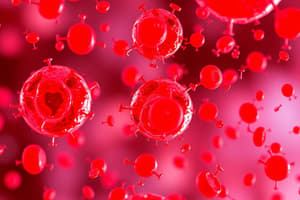Podcast
Questions and Answers
Iron deficiency anaemia is caused by an excess of iron in the diet.
Iron deficiency anaemia is caused by an excess of iron in the diet.
False (B)
Aplastic anaemia is caused by an overproduction of new red blood cells.
Aplastic anaemia is caused by an overproduction of new red blood cells.
False (B)
Anaemia can be a result of autoimmune disorders but not kidney disease.
Anaemia can be a result of autoimmune disorders but not kidney disease.
False (B)
Symptoms of vitamin B12 deficiency anaemia include confusion and forgetfulness.
Symptoms of vitamin B12 deficiency anaemia include confusion and forgetfulness.
Treatment for iron deficiency anaemia includes decreasing iron-rich foods in the diet.
Treatment for iron deficiency anaemia includes decreasing iron-rich foods in the diet.
Hemolytic anaemia occurs when white blood cells are destroyed faster than the body can produce new ones.
Hemolytic anaemia occurs when white blood cells are destroyed faster than the body can produce new ones.
Anaemia primarily affects middle-aged individuals in high-income countries.
Anaemia primarily affects middle-aged individuals in high-income countries.
Improving dietary intake of iron and vitamin D is not considered a relevant prevention strategy for anaemia.
Improving dietary intake of iron and vitamin D is not considered a relevant prevention strategy for anaemia.
Anaemia has no impact on work productivity or neurological development.
Anaemia has no impact on work productivity or neurological development.
Understanding the different forms of anaemia and their underlying causes is not important for accurate diagnosis.
Understanding the different forms of anaemia and their underlying causes is not important for accurate diagnosis.
Flashcards are hidden until you start studying
Study Notes
Overview of Anaemia
Anaemia is a condition characterized by a decrease in the number of red blood cells or haemoglobin levels in the blood, leading to a reduced oxygen-carrying capacity. Anaemia can have various causes, including dietary deficiency, malabsorption, inherited disorders, autoimmune disorders, kidney disease, chronic inflammatory diseases, blood loss, toxins or medications, and periods of increased need.
Iron Deficiency Anaemia (IDA)
Iron deficiency anaemia is a common form of anaemia caused by a lack of iron in the diet or decreased absorption of iron from the gut. Iron is essential for the production of haemoglobin, a protein in red blood cells that carries oxygen to tissues. Symptoms of IDA include fatigue, lightheadedness, and cold extremities. Treatment includes iron supplements and dietary changes, such as increasing iron-rich foods in the diet.
Vitamin B12 Deficiency Anaemia
Vitamin B12 deficiency anaemia occurs when the body does not have enough vitamin B12, which is essential for the production of red blood cells. Symptoms include fatigue, lightheadedness, and difficulties walking, as well as confusion and forgetfulness. Treatment involves vitamin B12 supplements or injections.
Other Types of Anaemia
Other types of anaemia include aplastic anaemia, which is caused by a failure of the bone marrow to produce enough new red blood cells. Hemolytic anaemia occurs when red blood cells are destroyed faster than the body can produce new ones, often due to an autoimmune response.
Prevalence and Impact of Anaemia
Anaemia affects approximately one-third of the world's population, contributing to increased morbidity and mortality, decreased work productivity, and impaired neurological development, particularly in low- and middle-income countries. It is most prevalent in preschool children and women of reproductive age.
Conclusion
Anaemia is a common condition with various causes and types. Understanding the different forms of anaemia and their underlying causes is crucial for accurate diagnosis and appropriate treatment. Prevention and management strategies should focus on addressing the specific cause of anaemia, such as improving dietary intake of iron and vitamin B12, addressing malabsorption issues, and treating underlying medical conditions. By addressing anaemia, individuals can improve their overall health and well-being.
Studying That Suits You
Use AI to generate personalized quizzes and flashcards to suit your learning preferences.




